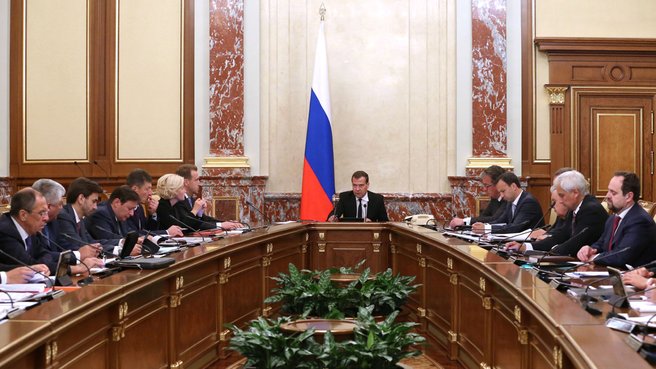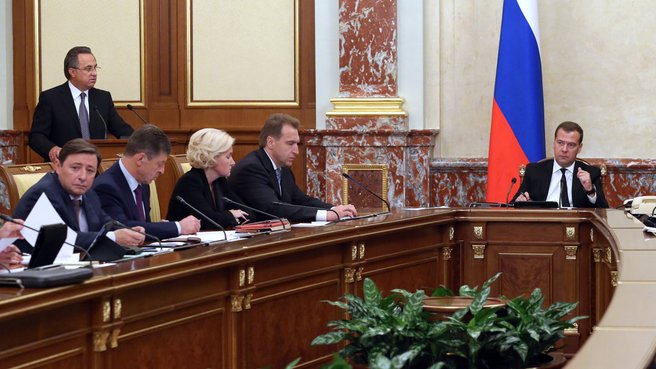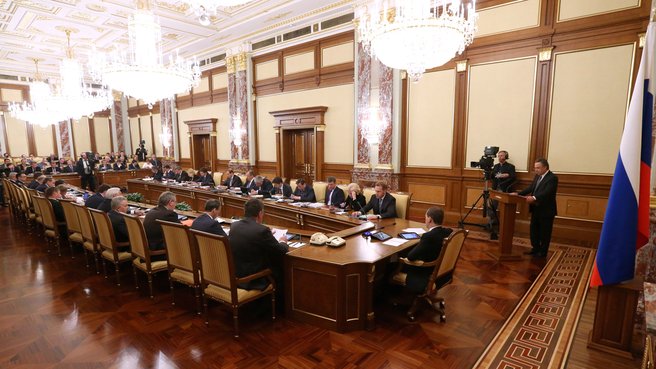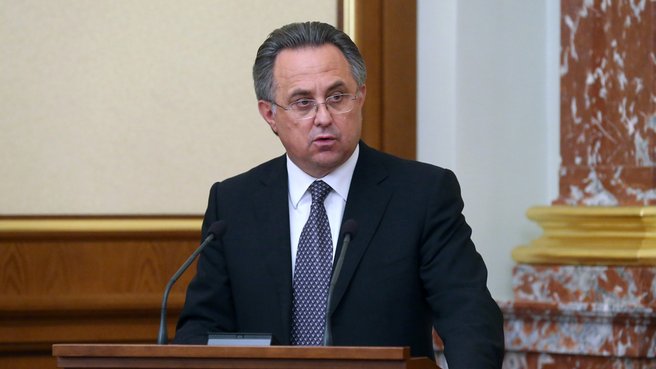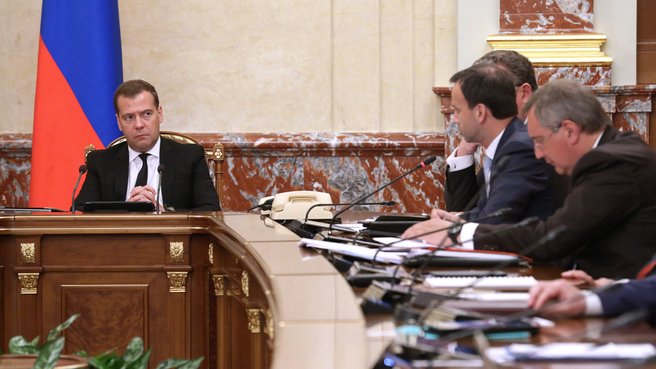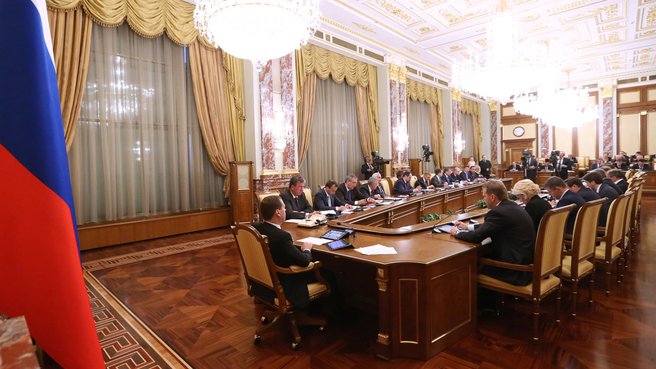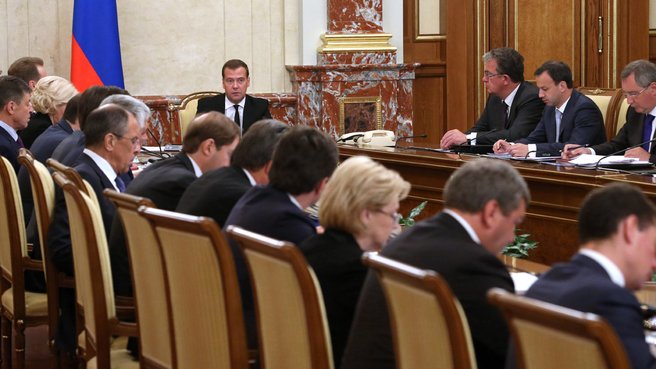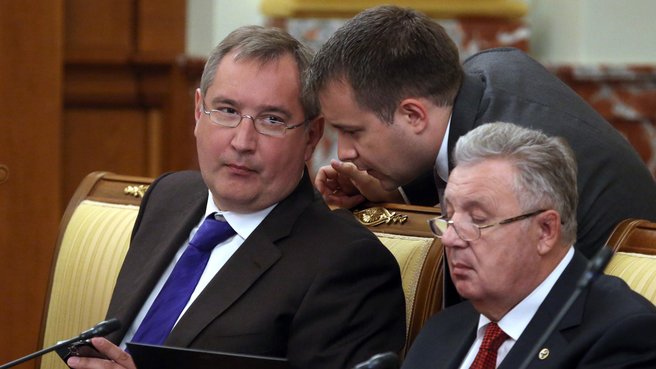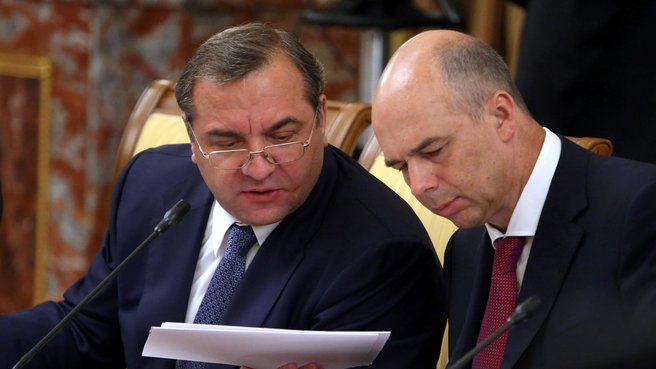On the agenda: the programme for preparing for the Russia 2018 FIFA World Cup, and eight other issues.
Transcript:
Dmitry Medvedev: Good afternoon, colleagues.
I'll start with the Budget Message, which has just been presented by the President. Clearly, the message includes several major goals, especially given the difficult situation on the global markets and our own economic problems.
It's clear – we heard this today as well – that we need to focus on important priority projects, because we don’t have enough money to fund all of them: in particular, the modernisation of the economy and the promotion of innovation-based activities and attracting investment. Of course, we need a system-based approach to spending. Accordingly, the federal executive authorities should be in charge of this work in accordance with their respective responsibilities, and Deputy Prime Ministers should coordinate it.
We are creating a programme-based budget, which we also discussed today. It is imperative that we accelerate the development of the long-term fiscal strategy and decide on ways to address pension issues, because this is an important topic. You've heard the rest, as well, so let’s get to work.
Let’s move on to the agenda of our meeting. In 2018, for the first time, we will be hosting the FIFA World Cup. This is an important event that has lots of ins and outs, but by then we will already have the Olympic Games and the World Student Games under our belt. Today we will be considering the preparation programme for these competitions, with the participation of 32 national teams and up to 1 million foreign guests, meaning the World Cup will have significantly more spectators than the Olympics. TV broadcasts will be watched by at least a third of the planet’s population.
Once again, the World Cup will be held after the World Summer Student Games, the Olympic and the Paralympic Games. We will be tackling various issues in the course of our preparations. In fact, this isn’t bad at all, because we will be refining the administrative techniques and resolving technical and logistical problems in the process. This also applies to compliance with international construction standards and providing various services, as well as building a barrier-free environment and maintaining environmental balance. I hope that it will also help us improve our security. This experience should be carefully considered when implementing the football project.
Considerable resources are being allocated for this. Total funding under the programme exceeds 660 billion roubles. Over half of it, taking into account what has already been allocated, that is 336 billion roubles, comes from the federal budget. The money should be used as efficiently and transparently as possible – this is imperative for any state programme, any state procurement. But in this case, let me repeat, it is a huge amount of money we are talking about.
Such an important international event is another opportunity to attract private investment, which should be used by all means. We must do everything we can to build a proper tourism infrastructure in Russia using federal and private investment capital. Unlike the Student Games and the Olympics, the World Cup will be held in 11 Russian regions at a time, which will, of course, provide a certain synergistic effect.
It is imperative that we provide proper conditions, not only to ensure a comfortable stay for fans and for accommodating teams, but also for familiarising people with the culture of our country and the respective regions.
The programme envisions the construction and renovation of 12 stadiums and 113 training sites. All those facilities should be used as much as possible after the event, so that our people have the opportunity to exercise, play sports, and improve their health. The accessibility of sport for ordinary people is a key indicator of quality of life, and we should aim for this.
Considerable resources are being allocated for this. Total funding under the programme exceeds 660 billion roubles. Over half of it, taking into account what has already been allocated, that is 336 billion roubles, comes from the federal budget. The money should be used as efficiently and transparently as possible – this is imperative for any state programme, any state procurement. But in this case, let me repeat, it is a huge amount of money we are talking about.
I should note that the draft programme has passed a public expert review, which I hope has improved its quality.
The Minister will report on the rest. We are also going to consider some other issues, which is why I suggest that we immediately start the discussion of the first issue. Mr Mutko, please, go ahead.
Vitaly Mutko: Thank you.
Mr Medvedev, colleagues, the FIFA Executive Committee took a historic decision on December 2, 2010 to hold the World Cup in Russia. In June and July 2018, eleven cities in our country will host 32 national teams who will play 64 matches. Mr Medvedev, in your introductory remarks you remarked on the significance of this event – it is indeed an unprecedented event, the whole world will be watching our country. Suffice it to say that the World Cup draws the largest global TV audience, about 3 billion people, and as you said, about 1 million tourists will arrive in our country. Moreover, hundreds of thousands of visitors will take part in daily football fan festivals across the country. The concept for the World Cup has been designed, submitted and accepted by FIFA, and according to it about 70% of the nation’s population will be involved in preparing for and participating in the world championship. The scale of the challenges involved in organising the preparation of cities for the World Cup far exceeds all previous sport competitions held in Russia in the past.
Pursuant to the President’s May 25th executive order and the instructions you issued regarding their implementation, a 2018 World Cup preparation programme has been drafted. The programme was worked out by the Organising Committee together with FIFA, 12 regions of the Russian Federation, including the Moscow Region, and 15 federal executive agencies. The key objective of the programme is to ensure a successful 2018 World Cup in the Russian Federation in accordance with government guarantees and declarations made by the Government to FIFA during the bidding process.
The programme comprises 11 subprogrammes given the various spheres involved and the scale of the challenges.
The programme covers a total of 283 facilities and nine events, they are all shown in the presentations. Subprogramme No.1 involves the construction and renovation, as you have already said, of 12 stadiums, 113 training sites near stadiums and the teams’ and referees’ accommodations, as well as erecting temporary structures on the territories of the stadiums necessary for hosting the World Cup. I’d like to note that five stadiums are under construction at the moment, the other seven stadiums are being designed, which will be finished by the year’s end. The construction will start next year. The tentative timetable for stadium construction is about 2.5-3 years.
Under subprogramme No. 2, 62 hotels for participants and spectators will be built, with a total capacity of 10,000 rooms, including five star hotels for FIFA officials and four star hotels for the teams. A new airport is to be built in Rostov-on-Don, 10 existing airports will be renovated and 11 road infrastructure objects will be built in the host cities under the subprogramme for the championship’s transport concept.
Most of these projects have been planned as part of the existing programmes. In some cases it was just suggested that we adjust the deadlines of the projects in view of the World Cup preparations schedule.
Under subprogramme No. 4, measures will be taken as part of the communications and IT concept being designed by the Ministry of Communications, which will be submitted to the Government for approval in the first quarter of 2015. Apart from that, the subprogramme involves the construction of an international broadcasting centre at the Luzhniki Olympic Complex with a total area of 30,000 square metres.
Renovation and major repairs of 13 medical facilities will be conducted under subprogramme No. 5 to ensure high-quality medical service for World Cup participants. Also, the ambulance fleet will be upgraded.
Subprogramme No. 6 involves the construction and renovation of 28 heating, water and sewage facilities which are directly related to the sports facilities.
The construction and renovation of 14 power supply facilities providing for the operations of the sports facilities will be conducted under subprogramme No. 7.
The next subprogramme has to do with objects and measures in Nizhny Novgorod and Samara related to vacating land for the construction of the stadiums.
Subprogramme No. 9 involves other measures related to preparations for the World Cup. It includes drafting and adopting 23 legislative acts. I’d like to report to the Government that the key document – a law on organising and holding the World Cup – has been adopted by the State Duma, signed by the President and is currently in effect. Drafting and adopting the concept of World Cup heritage, the draw ceremonies (the preliminary, first draw will take place in St Petersburg in 2015 and will be attended by representatives of all the 209 nations taking part in the qualifier draw), the 2016 Confederation Cup in Kazan and the final draw, this time in Moscow, of the World Cup in 2017.
Implementation of the volunteer programme involves training 25,000 volunteers in 11 cities.
The security programme includes a comprehensive set of measures to ensure safety and security during the preparation and hosting of the World Cup. Where measures are to be taken and their funding are to be specified in the course of its drafting which, according to the federal law, should be approved by the President of the Russian Federation. The implementation of the management programme includes measures taken by the Planning and Monitoring Centre to monitor the implementation of 30 infrastructure projects and measures.
We have done a great deal of work in optimising expenditures, sorting out the programme components and the cost of each one, of delimitating the levels of power and of attracting non-budgetary sources of finance. As a result, we have worked out the programme that you mentioned today; it will cost 664.1 billion roubles, of which 336.2 billion will be funded from the federal budget. I should say that 86.2 billion roubles have already been provided for in the existing programmes; another 250 billion need to be found. Federal constituent entities are expected to contribute 101.6 billion roubles, which is about 15%. Non-budgetary sources should bring in 226.3 billion roubles, i.e. 34%.
Colleagues, as a result of the implementation of the programme, a contemporary sporting infrastructure will be created, as well as transport and hospitality facilities for the World Cup and other events, including the FIFA Confederations’ Cup. Also, substantial funds are being invested in the country’s economy; jobs are being created; the areas in question and Russia as a whole will become more attractive to tourists. The programme has been discussed with all federal executive bodies, adopted by the governors of constituent entities, undergone several discussions with First Deputy Prime Minister Igor Shuvalov, with Deputy Prime Minister Arkady Dvorkovich, and has been presented to you, Mr Medvedev. Thus, we have taken into consideration all the comments we had from the Ministry of Economic Development, and the entire text of the programme has been agreed with them. We are now discussing with them the optimal cost of a standard stadium which will serve as a prototype for all other stadiums.
The Ministry of Finance – practically all of the remarks have been taken care of. We have to single out two remarks that will have to be elaborated. It has been proposed to exclude the construction of the underground from the programme, as the metro will be built with funds from the constituent entities of the Russian Federation, while the resources would rather be allocated towards improving roads and streets. Other remarks have been taken into account and incorporated.
To conclude, I’d like to express my sincere appreciation of our colleagues because it is a really optimal programme, well-balanced, and I’d like to thank Mr Shuvalov for the great deal of attention that he showed the programme, and, of course, the Government Staff for upgrading the programme.
The programme is very well balanced and optimal, and I ask you to approve it.
Dmitry Medvedev: I see, thank you. Please, colleagues, any comments, suggestions, additions to the Minister’s report on the World Cup preparation programme?
Maxim Sokolov: Mr Medvedev, I’d like to say that we support the addenda to the programme submitted by the Minister of Sport. The necessity for such a change was uncovered in the course of upgrading the proposals, and since it was the final stage, we support the proposal to adopt it directly at the Government’s meeting.
Apart from that, I want to say that there many unresolved issues in terms of transport infrastructure development. For instance, the issue of building temporary terminals in host cities requires a separate solution.
We understand that the (funding) sources have not been identified, so we will keep working on this. We still have time for that. And upgrading the urban public transport properly... Here, if we decide in the framework of the budget process to support the subsidies programme for purchasing new busses working on natural gas, then this programme can be interconnected with public transport upgrades because we had similar decisions in the Olympics project, although there wasn’t a natural gas fuel requirement… On the whole, we emphasise the significance of the work that the Ministry of Sport has done, and ask to support it.
Dmitry Medvedev: Thank you. Yes, Mr Siluanov.
Anton Siluanov: Mr Medvedev, colleagues, the Ministry of Finance has approved this programme. The volume of funds allocated from the federal budget is indeed quite significant. I would like to say now that the experience of previous large-scale events such as Sochi, the Universiade prove that in the course of pursuing large projects there arise issues related to the growing cost of certain works or to the emergence of proposals concerning the addition of some other objects, etc.
For that reason, we think that it is reasonable to finalise a decision today that the amount of extra expenses of 250 billion roubles may not be changed.
By the way, we had the same practice of funding the APEC events. Mr Shuvalov gave an exact number of the funds from the federal budget, and the number was adhered to. So I think that we should follow the same path. Why did we express our concern with regard to funding metro construction in St Petersburg and Nizhny Novgorod?
Everything’s fine, yet these are not the priority tasks to be solved as part of the World Cup hosting. It will rather be to reserve those funds and if necessary, to redistribute them on such issues as, say, security, because we have funds for this. Still the final number will be adjusted in the course of the programme, or some other resources regarding measures to ensure the hosting of the World Cup.
I’d like to underscore that we agreed on the amount of funding, and it will be earmarked in the budget, and I’d like to warn our colleagues… Let’s agree that we are not going to additionally allocate more than 250 billion roubles on this issue.
If there is a need, let us set up a reserve fund instead to be promptly used if some additional measures have to be taken to implement that task.
Dmitry Medvedev: Okay, you have been heard. Please, any other comments? Yes, Mr Shuvalov.
Igor Shuvlov: Mr Medvedev, colleagues! Mr Medvedev, your instructions following the meeting on preparing this programme have been realised, and the measures listed in the programme are exclusively related to the development of the regions themselves and the cities in those regions. In essence, only those facilities that concern the World Cup… These are stadiums to be built or reconstructed…
All of the rest is the city’s infrastructure – transport, power, communications, healthcare facilities and so on… Everything that will become the heritage of the World Cup. Even the federal budget funds, the 336 billion to be allocated for those objects… The amount going to the World Cup itself will be much smaller.
The requests that we received from the regions mainly concerned the upgrading of utility services, such as the water and energy supplies and sewage. We have financed the most important spheres. In fact, we have just one issue left to deal with – and we are at risk of not being able to cope with it – the construction of a new airport in Rostov-on-Don. It is very difficult to build an airport in an open field, so that by the summer of 2018 it could be ready to accept passengers. The Governor is insisting that instead of upgrading the existing airport, we, together with a private investor, should build a new airport. Specialists claim that a new airport is necessary in general, but we have a very strict time frame. Most of the work has been done in discussing the relevant issues, including security matters. The Ministry of Finance, as I have already reported to you, has certain questions, including about whether the 30 billion roubles calculated for the purpose will be sufficient. However, upon discussions with all the relevant authorities, we have so far decided to reserve just the same amount of money.
I share the Finance Minister’s view that right now we must start contracting out without any further delay and without expecting any further increases in funding. As far as the transport infrastructure is concerned, a lot of work has been done, it has all been discussed in detail at a number of meetings with you, Mr Medvedev, as well as with Mr Dvorkovich and Mr Sokolov. Of course, we wanted as many transport facilities built as part of the World Cup, but we ended up with what we can afford right now. May I therefore ask you to approve this programme.
Dmitry Medvedev: My first question concerns the airport you mentioned. Such an airport is probably necessary, and building a brand new one is probably a good idea. However, we cannot jeopardise the tournament if there is risk it won't be built in time. What I would like to understand is whether we can really build it based on our current capabilities.
Arkady Dvorkovich: According to all the regulations, and without any unexpected delays, the airport should open right at the end of 2017.
Dmitry Medvedev: There will be delays, take my word for it.
Arkady Dvorkovich: Yes, the risks are great. During the meetings that Igor Shuvalov and I held, we agreed that by September all the particulars would be finalised. If we find that the risks are too high, we'll change the decision in favour of modernising the existing airport.
Dmitry Medvedev: Will you be able to modernise it if you start in September?
Arkady Dvorkovich: Yes, without any doubt.
Dmitry Medvedev: I can understand the regional governors’ desire to have new facilities built and some of their problems solved, but we cannot afford to jeopardise the main task. Therefore, please make up your mind and report on whether you suggest building a new airport or modernising the existing one.
Concerning what has been said about safety... We all understand that a certain reserve has been created. We shall be guided by the figures we have, but the main indicator for us will be the result of the main sports events that are to be held quite soon: I mean the World Student Games and the Olympics. We shall look at the results and then see what needs to be done. If problems arise – and I hope they don't – we shall solve them.
Are we all in agreement? Any other questions concerning the report? No? Then the decision on the first item of the agenda is approved.
<…>
